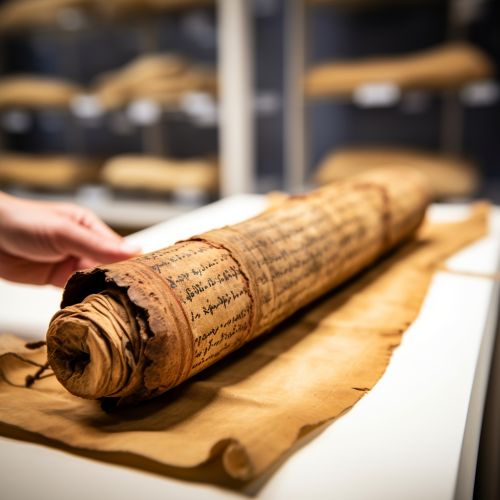Ketuvim
Introduction
The Ketuvim (Hebrew: כְּתוּבִים, "writings") is the third and final section of the Hebrew Bible, after the Torah (instruction) and the Nevi'im (prophets). In English translations of the Hebrew Bible, this section is usually titled "The Writings" or "The Hagiographa". The Ketuvim are believed to have been written under the Ruach HaKodesh (Divine Inspiration) but with one level less authority than that of prophecy.


Composition
The Ketuvim consists of eleven books, divided into poetic books, the "Five Scrolls", and other books. The poetic books include Psalms (Tehillim), Proverbs (Mishlei), and Job (Iyov). The "Five Scrolls" are Song of Songs (Shir HaShirim), Ruth (Rut), Lamentations (Eicha), Ecclesiastes (Kohelet), and Esther (Esther). The other books are Daniel (Daniel), Ezra-Nehemiah (Ezra), and Chronicles (Divrei Hayamim).
Canonical Order
The order of the books in the Ketuvim is not uniform. In the Talmudic period, the order of the books in the Ketuvim was flexible, as it is in most modern Jewish bibles. However, in many Christian Old Testaments, following the Septuagint, the order is different.
Literary Features
The Ketuvim is characterized by a wide range of literary genres, including poetry, wisdom literature, narrative, and apocalyptic literature. The books of the Ketuvim also exhibit a variety of theological perspectives and understandings of God, humanity, and the world.
Historical Context
The books of the Ketuvim were written over a long period, from the time of Solomon in the early first millennium BCE to the time of the Second Temple in the late first millennium BCE. They reflect the historical, cultural, and religious contexts of their times, providing valuable insights into the life and thought of ancient Israel.
Theological Themes
The Ketuvim explore a wide range of theological themes, including the nature of God, the human condition, the problem of evil, the nature of wisdom, and the hope for a messianic future. They also express a deep sense of religious devotion and piety, as well as a profound wrestling with doubt, despair, and the mystery of divine providence.
Influence and Reception
The Ketuvim has had a profound influence on the religious, moral, and intellectual life of the Jewish people, and has also played a significant role in Christian thought and spirituality. Its books have been studied, interpreted, and prayed over by countless generations, and they continue to inspire and challenge readers today.
